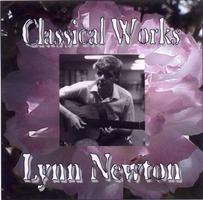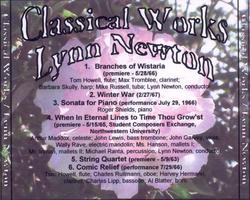

| Neologistics→ Music → Classical |
The artwork for Classical Works was created by Charles Wolff, and also all the grunt work of extracting it from tapes. A short discussion of each recording follows the cover images. I may add more MP3s later. Click on either image to see it full size.
 Branches of Wistaria
Branches of WistariaThis rendition of Branches of Wistaria, for flue, clarinet, harp, and tuba, was the closing work on a concert of new music. It's an extraordinarily difficult work because of its delicate ensemble moments and extended instrumental techniques, such as the use of complex chords on the flute. Even after an estimated 35 hours of rehearsal, the performance is a bit ragged in some places, but overall it's not bad.The same ensemble did a second performance two months later, at my senior recital, but it wasn't as good. I put that recording on Whatever Works.
Branches of Wistaria is the best composition I produced during my student days. The title, including the less-preferred spelling of "wistaria," is from a T.S. Elliott poem.
My last two years at University of Illinois I worked in the school's electronic music studio. After a couple of lessons on how to use all the gear, I was turned loose to do whatever I wanted in there. Winter War is the best of four pieces that came out of that effort.
I can't claim to have set out to write a piece of music with Winter War. It was a case of trying some things and putting them all together, and this was the result. It didn't take long — three sessions at most.
I've always liked the intensity of the beginning, particularly the climactic buildup that goes from 1:00 — 1:20. The remainder of the piece from that point on is all based on manipulated voice sounds (my own), with little punctuations from a Moog synthesizer.
I often worked in the studio very late at night. The music school employed a kindly but fussy old janitor who cleaned at night. When I was working on Winter War he came and knocked on the door, wringing his hands with concern that I was driving the speakers too hard, and that they might blow out and cost the school money. He was probably right, but I assured him that everything was fine and went on working. This piece needs to be heard loud.
The excellent performance is by Roger Shields. The recital was recorded remotely over a line that had the polarity reversed or something, so the tapes are nearly ruined by the presence of a loud hum. In the quieter parts, notes in the higher register of the piano are all but inaudible. But this is the only recording I have of this work, so I'm obliged to use it.
Roger Shields was a pianist of phenomenal talent. I could spend an evening telling stories about his astonishing abilities, not to mention his eccentricities. In 1975 Roger gave up performing and has made his living teaching ever since, and also directing the Soulima Stravinsky international piano competition.
Sonata for Piano was written for Roger, and was designed to challenge his seemingly limitless technique. At the time Roger was not yet exactly fond of new music. When I finished the Sonata, after working on it for about eighteen months, it took a while and some coaxing for him to get around to actually learning it. After I won the Bearns Prize from Columbia University with this work, he changed his attitude about it.
Eventually Roger became an accomplished performer of new music. He worked for at least a year with Lucas Foss' new music ensemble in Buffalo, New York. The bulk of his commercial recordings were of contemporary music.
Subtitled "A Sextet for Seven Players," this work is scored for celeste, bass trombone, electric mandolin, viola, mallet instruments (broken up between two players), and a mountain of percussion instruments. The title is a line from a Shakespeare sonnet.
Percussionist Michael Ranta, who later became my housemate for a summer, was a tall, graceful, good-looking blond guy. He was an impressive sight to watch when he played works requiring a large arsenal of percussion instruments (which was in vogue at the time), because he would choreograph his motions in moving between them.
This performance was the premiere performance, given at a student composers symposium at Northwestern University. It was performed again by the same ensemble, which I conducted, two or three weeks later.
In high school I wrote an ambitious single movement of a string quartet and an additional experimental one-measure second movement, but I never counted that work among my compositions until recently, probably because I regarded it as unfinished and never copied it or had it read or performed. Technically, therefore, the quartet presented here is my second string quartet, but the title remains simply String Quartet. It is Webernesquely sparse, in four highly compact movements, titled I, II, III, and IV.
This quartet was a breakthrough work for me, the composition that marked my complete transition from a more conservative and traditional style of music to serial and post-serial techniques. Another performance was given at the University of Iowa, but I have lost the tape.
The first violinist was David Preeves, whose father Milton Preeves was principal violist of the Chicago Symphony, and my father's friend and stand partner in that orchestra for several years. Last I heard, David is still playing music in Minnesota, but also owns a business in something exotic, such as artificial hearts or some such thing. I no longer recall who any of the other performers were.
Speaking of conservative and traditional: this is it! Comic Relief, my first composition while a college student, was written as an assignment. I didn't particularly like it then, nor do I now, and I utterly resented having to include it on my senior recital just to fill time. It embarrassed me because it represented a type of music I was never much interested in myself, and ultimately rejected completely. I renamed it Comic Relief for the sake of the recital, because I thought it was a joke, but its original title was Introduction and March.
To make matters worse, the performance is poor. It's not a difficult piece. I believe the players simply got together and read through it a couple of times without rehearsing carefully. I was unable to attend the rehearsals, and heard it myself only at the performance. I was shocked at how slowly they played the first movement. It's nearly catatonic. For all that, there is hardly an attack they manage to play together. Ugh. As I recall, the premiere performance wasn't too much better. That tape has long been lost.